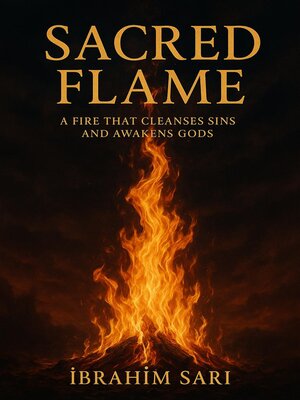
Sign up to save your library
With an OverDrive account, you can save your favorite libraries for at-a-glance information about availability. Find out more about OverDrive accounts.
Find this title in Libby, the library reading app by OverDrive.



Search for a digital library with this title
Title found at these libraries:
| Library Name | Distance |
|---|---|
| Loading... |
Sacred Flame is a bold work of literary allegory that reimagines faith, bureaucracy, and everyday mercy as the true foundations of civic life.
The city of Khar Iskar does not conquer empires with armies or prophecy. Instead, it survives through benches, ledgers, lids, pegs, and promises made legible to everyone. Here, a bell refuses to sing, choosing instead to count—UP, DOWN, HOLD—the rhythm of ropework, soup kitchens, and schedules that keep panic from turning into spectacle.
This is not a book of saints or saviors. It is a novel of citizens learning to prefer furniture to prophecy, rules to rituals, competence to charisma. Sermons are replaced by loaf gauges, hymns by LISTEN plates that click when truth bends, and confessions by SAY/HEAR stones that turn noise into facts. The flame of the title is real but modest: carried in a tin from bench to forge, sacred because it is small, supervised, and useful.
The city's devotions are verbs:
In Khar Iskar, spectacle is hung on hooks until it cools. Words like plague, raid, forever, awaken are stripped of theatre and translated into work—wash, schedule, amend, count. The novel's rhythm is procedural on purpose: law is posted, read aloud, argued with, amended, and nailed back up. Repetition becomes liturgy, and liturgy becomes safety.
The people of this city are stewards rather than heroes: Lyssara, who keeps power small; Vaun, who writes laws with margins; Sorev, who posts mercy in public; Ferrine, who invents modest tools that make miracles ordinary. Their antagonists are mostly words that have grown too big for their jobs.
Sacred Flame is a meditation on governance, religion, and mercy—an allegorical manual disguised as a novel. It insists that decency can be bureaucratic, that justice can be dull enough to be kind, and that the gods we can afford are the ones small enough to live in tools, not thrones.
For readers of allegorical, political, and religious literary fiction, this novel offers a steady, deliberate vision of civic faith: a prayer made of ledgers, lids, and patience.







